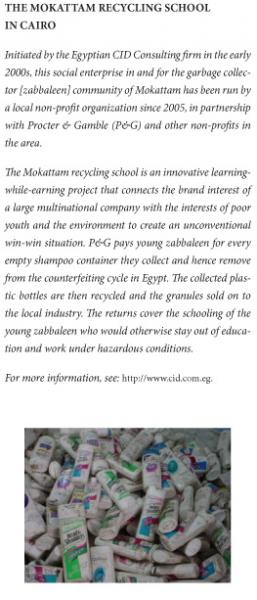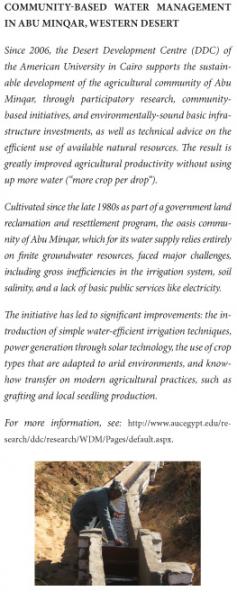Using Egypt as a case study, this essay argues that the pathway to sustainability in the Middle East is to gradually reconcile competing economic development and environmental agendas. However, broader economic and political forces are inimical to setting about such a sustainable development trajectory. An exception to this adverse trend is the existence of innovative local development initiatives, which connect the livelihoods of the poor and marginalized with their physical environment in a productive way. Findings are based on the launching conference and information collected as part of the WinWin Initiative (www.winwininitiative.net), a Middle East and North Africa (MENA) initiative to build a network of local practitioners and researchers who work to improve people’s lives and the environment.
Acute environmental challenges increasingly affect people’s lives in Egypt: the environmental impact of uncontrolled urban expansion in the Nile Delta, the health threats posed by polluting industries, loss of arable land and declining yields due to desertification and increasing soil salinity, pollution in coastal and maritime areas, and the shrinking of freshwater resources. Many Egyptians no longer take for granted the environment’s carrying capacity to support Egypt’s current economic development trajectory into the long-term.
The only way out of this impasse in Egypt, as elsewhere in the Middle East, would be a paradigm shift towards treating the environment as an asset, not just a collateral cost of economic development. If policy makers treated the environment as an asset they would take a more balanced approach to trade-offs between competing economic development and environmental agendas and seek out more win-win opportunities where development meets both human and environmental interests.
Yet, such a shift cannot yet be observed. To the contrary, four broader economic, political, and institutional obstacles lie in the way towards sustainability in Egypt.
First, the prevailing economic development paradigm in Egypt favors foreign direct investment-led economic growth at the expense of both local environmental and developmental concerns.[1] A case in point is the government-backed plan by the Canadian consortium EAgrium to build a large fertilizer plant near the Mediterranean port city of Damietta. For fear that pollution from the plant would affect their main sources of income in the area — tourism, real estate, and fishing — a broad public coalition mobilized in protest in 2008, although to little avail.[2] 
Second, pressing development challenges usually take precedence over the environment. Public investments into housing, education, and employment creation are much more urgent from a development and political standpoint. This is why they tend to crowd out environmental investments. The current political impasse in Egypt is likely to reinforce this obstacle in the near future.
Third, amidst socio-economic and political instability, pricing the use of natural resources such as water and energy to incentivize more sustainable use has become virtually impossible from a political standpoint. As a consequence, the Egyptian government has recently stalled its gradual removal of energy subsidies for certain types of industries for fear that consequent price hikes could fuel social unrest.[3]
Finally, although the government of Egypt recognizes its responsibility to tackle pollution and environmental degradation and has a body of environmental law, structural problems stand in the way of more sustainable solutions. Conflicts in cross-sectoral policy formulation and poor line ministry coordination are major stumbling blocks to effective mainstreaming of environmental considerations into national policy making. When it comes to implementing environmental policies, Egypt’s increasingly unsteerable, rent-seeking bureaucracy presents great problems. For example, pervasive corruption prevents the comprehensive, serious application of environmental laws and regulations, particularly to key industrial players.
Considering these obstacles to introducing a more sustainable development paradigm in Egypt, the prospect for getting on a sustainable development path would be bleak, were it not for the work of local change agents. In areas such as solid waste management and agriculture, their innovative local projects succeed at connecting the livelihoods of the poor and marginalized with their physical environment in productive ways. On a local scale, they prove to decision makers that it is not only desirable but also possible to reconcile developmental and environmental agendas.
To scale these initiatives up and show how international donors could best support them, more information about the characteristics, success factors, and challenges of these projects is necessary.
Finding and systematically collecting information on all the local initiatives in the MENA region is one of the key objectives of the Cairo-based WinWin Initiative. Initiated by the German Hanns Seidel Foundation and run in partnership with the Egyptian State Information Service (SIS) and the United Nations Environment Programme (UNEP), the WinWin Initiative has set about the development of an interactive MENA network of local practitioners, researchers, and the interested public who search for practical ways to improve people’s lives and safeguard the environment.
While the initiative is still young and has yet to achieve the coverage and level of know-how exchange it aims for, there are five preliminary lessons learned that seem worth sharing already. They indicate ways to scale up local initiatives as well as ways for international donors to best support them.[4]
First of all, it is possible. Socio-economic development and environmental protection can and should go hand in hand. This is especially true for sustainable agricultural development in the arid climates of the MENA, where raising productivity in the long-term is impossible without more efficient usage of natural resources.
Second, the onus of leadership for change is on the privileged members of society. The innovative local win-win projects that have been identified so far all originate with outstanding individuals from the narrow upper class of Egyptian society or from the international community in Egypt. Moreover, many projects would not be as successful without additional funding and in-kind support from third parties. Ordinary people generally do not have the means or the convening power to act as change agents for sustainability.
Third, sustainable local initiatives cannot make up for continued bad governance. Most local initiatives address local environmental and development issues that arise because state interventions are absent or wrong. During implementation, many encounter constraints originating from the state bureaucracy. Decentralization reforms could create more responsive local administrations and incentivize sustainable local development more generally. Previous reform pilots in the Fayoum and Ismailia governorates show this.[5] Stalled decentralization reforms in Egypt should therefore be re-activated as soon as possible.
Fourth, adapting international financial assistance to the needs of local change agents could make a significant contribution to sustainability in the MENA. Because of their incremental and often voluntary nature, local projects can achieve much with very little funding. But they require such funds for much longer time periods, which exceed the average planning horizon in contemporary international development assistance to local projects by far.
And finally, the international community could play a more effective role as facilitator of local sustainability learning, exchange, and replication. Most local change projects that have been identified by now run in a fairly independent and informal manner, with little capacity for lobbying and networking. More easily accessible and flexible international support could boost local change agents’ capacity and have positive spillover effects along the difficult path to sustainability in the Middle East and North Africa.
[1]. Roger Zetter and Hassan Al-Moataz, “Urban Economy or Environmental Policy? The Case of Egypt,” Journal of Environmental Policy and Planning, Vol. 4 (2002), p. 182.
[2]. For a detailed analysis of the Damietta case, see Sharif Elmusa and Jeannie Sowers, “Damietta Mobilizes for Its Environment,” Middle East Report Online, October 21, 2009.
[3]. “Al-hukuma tatajah li-ta’jeel ‘al-marhala al-thalatha min ziyadat as’ar al-taqa khowfan min irtifa’ s’ar al-sila’ wal-muntajat” [“The Government Delays the Third Phase of the Increase of Energy Prices, Fearing a Rise in the Prices of Goods and Products”], http://www.almasry-alyoum.com/article2.aspx?ArticleID=284486&IssueID=20….
[4]. Findings are based on the launching conference and information collected as part of the WinWinInitiative, a MENA initiative to build a network of local practitioners and researchers who work to improve people’s lives and the environment. For more information, see http://www.winwininitiative.net.
[5]. Interviews with senior experts for decentralization at the Egyptian Ministry of Local Development.
The Middle East Institute (MEI) is an independent, non-partisan, non-for-profit, educational organization. It does not engage in advocacy and its scholars’ opinions are their own. MEI welcomes financial donations, but retains sole editorial control over its work and its publications reflect only the authors’ views. For a listing of MEI donors, please click here.












